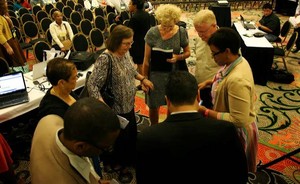In light of George Zimmerman’s acquittal last month of the murder of Trayvon Martin, a panel of Presbyterian leaders talked race matters Saturday (Aug. 3) at Big Tent.
The discussion, which lasted almost two hours, pointed up how difficult the subject remains, as audience members made small speeches, some ― including one panelist ― chastising panelists for not spending more time talking about the shooting and subsequent trial.
“Race is not an easy topic to address,” said Marcus Lambright, a member of the Cross Cultural Young Adult Network. “For the generation before mine, it always lingers in the back of their head. For my generation, there is more tolerance for race. It is very personal, but we don’t have to make it as angry and as loud as some people have made it.”
Audience members wondered why the panel contained no Native Americans and why some nationalities, including Pakistanis, aren’t represented among national church staff.
When the church produces documents that aren’t translated into Spanish, said one audience member, they often go straight to the recycling bin.
Near the end of the discussion, Arlene Gordon, president of the National Black Presbyterian Caucus, said she’d have preferred more discussion about the Martin killing and subsequent trial.
“A young black man was killed and a white man walked away,” she said. “We should have been discussing that today. Those issues we are raising, there is another platform for that.”
Bruce Reyes-Chow, former moderator of the General Assembly, told the crowd that “we know in our gut that if we don’t work through our conflict, it won’t get better. I’ve been painfully aware how much of our nation’s race dialogue is black/white. People say to me, ‘So, you’re Asian,’ or ‘I just never thought of Asians in race conversation.’”
He said that the people who “built” the denomination during the 1950s and 1960s “must be able to let go of power and position.” Those succeeding them should be “people who can speak of race, class and gender in the vernacular of the day.”
“I hope what comes out of this moment is a realization that there is much, much work to do to see the world as God sees it,” said Gradye Parsons, Stated Clerk of the General Assembly. “It’s going to be hard. It will involve the church being willing to risk things it may not be willing to risk.
Teresa Chavez Sauceda, chaplain resident of the University of California-Davis Medical Center, said she believes change will come at the presbytery level. “They can do a great deal to help foster growth of new kinds of congregations, or they can get in the way,” she said. “It’s changing hearts and minds as much as it is changing practices.”
Linda Valentine, executive director of the Presbyterian Mission Agency, summed up the discussion this way: “This brief conversation has shed light on the fact that we need more and longer conversations.”
Big Tent, Aug. 1-3, is a celebration of Presbyterian Church (U.S.A.) mission and ministry organized around the theme “Putting God’s First Things First.” It’s composed of 10 national Presbyterian conferences, more than 160 workshops and special events to mark the 30th anniversary of the formation of the PC(USA) and the 25th anniversary of the opening of the Presbyterian Center here.

